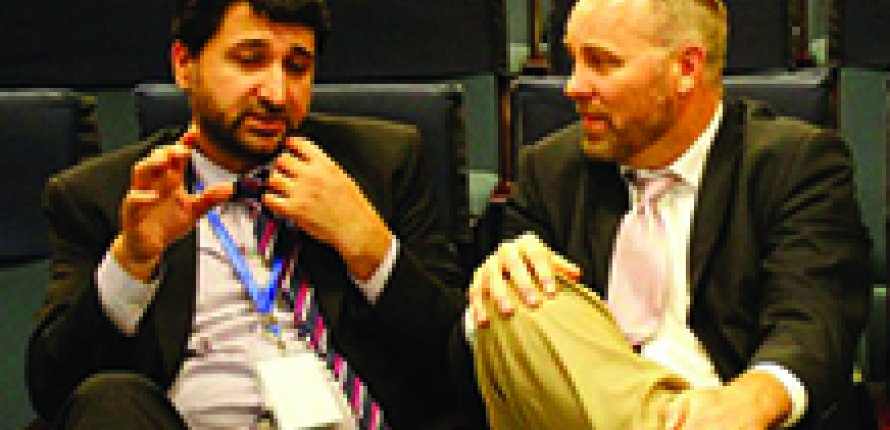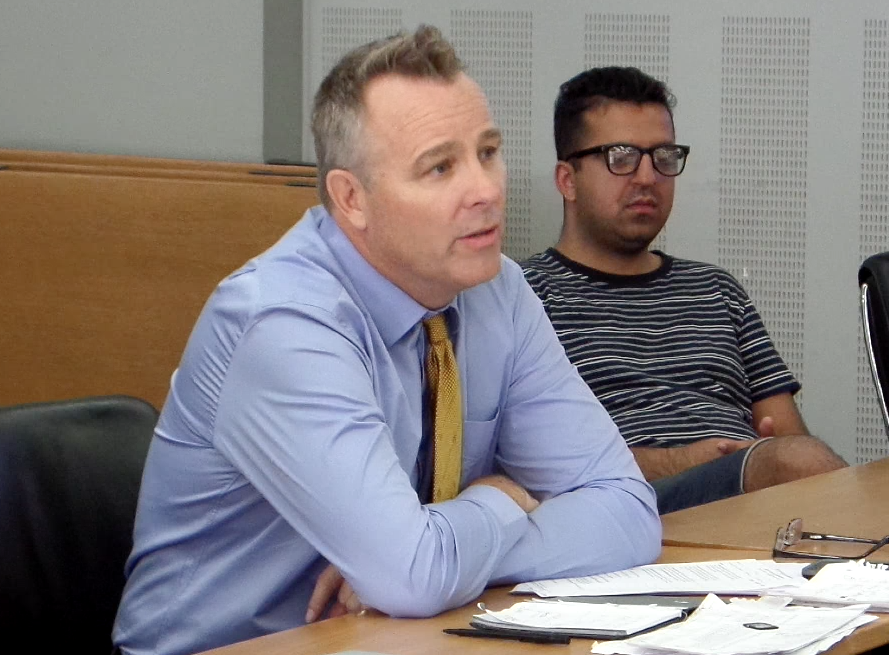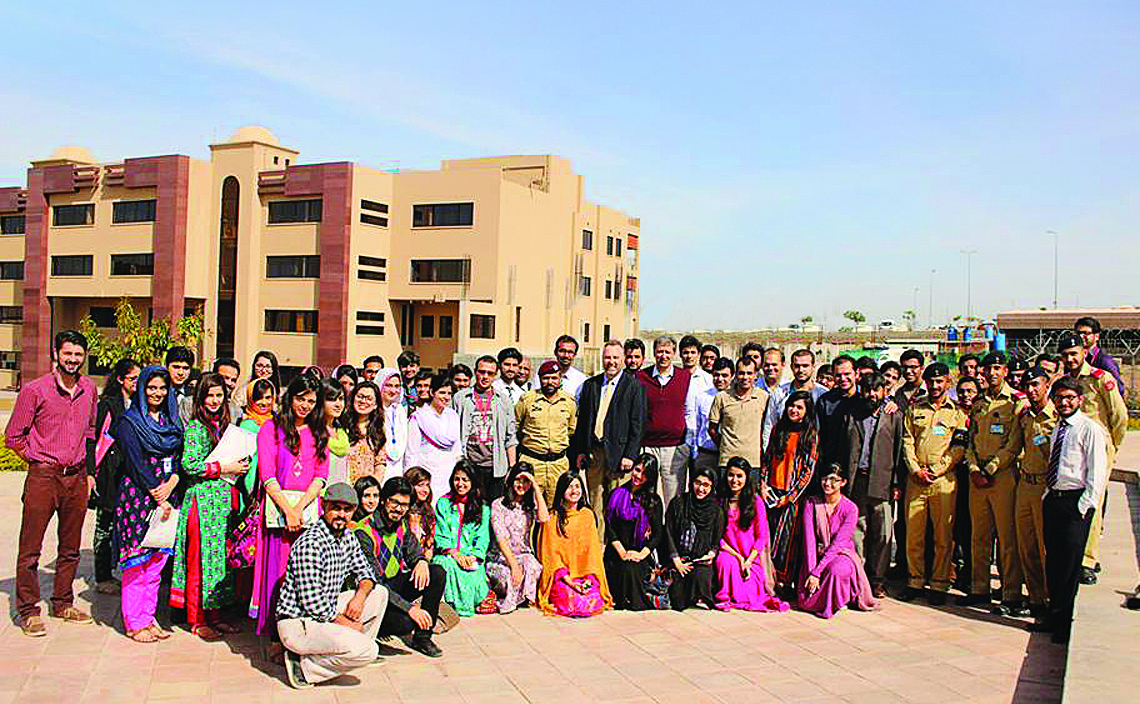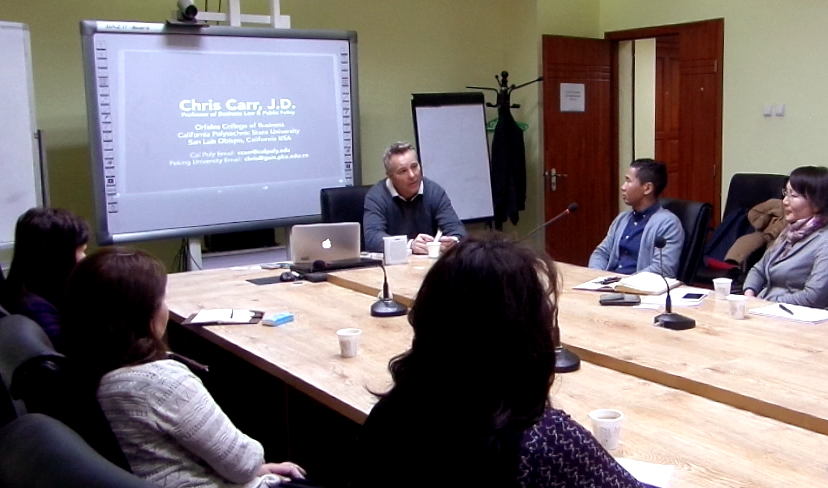Growing Entrepreneurship, Rule of Law, and Presentation Innovation in Tunisia, Pakistan and Mongolia

Chris Carr, J.D., Professor of Business Law and Public Policy, California Polytechnic State University, San Luis Obispo
Fulbright Specialist to Tunisia (2011), Pakistan (2015) and Mongolia (2016)
 Fulbright awards are transformational gifts.
Fulbright awards are transformational gifts.
As an academic, you experience the joy of teaching students. You research challenging questions in your field, publish the findings, and hope someone will read and act on them. Yet, even as professors we can find ourselves in an intellectual rut. Careers plod along, and you begin to question whether you’re making a difference.
The Fulbright Specialist Program provided a timely antidote to re-energize my academic passions. I have been a Fulbright Specialist to three countries - Tunisia, Pakistan, and most recently Mongolia.
I applied to be a Specialist because I felt I had become experienced enough in my teaching, research, and applied business knowledge to have something of real value to offer a foreign university, NGO, or entrepreneur launching a start-up. I also served for five years as a battle-tested associate dean in my business school, so I’m fairly well versed on curriculum development and program assessment.
A Specialist award was also attractive to me because of its shorter length. In each country visited I provided lectures and seminars on capacity building via entrepreneurship, rule of law, and even presentation design (including effective data visualization). Yes, that’s right and not a typo – presentation design and innovation. One can’t succeed and move up in business or government if they can’t present and pitch their ideas quickly, clearly and persuasively, and the ability of a populace to deliver action-oriented, audience-centered presentations is critical to that society’s ability to build and maintain strong institutions. I was also asked to give seminars and advice on accreditation, curriculum development, and program assessment.
My first Specialist visit was to Tunisia, right after their revolution. The Tunisian revolution was the match that ignited the entire Arab Spring. You could feel the excitement in the air. Tunisia was overflowing with optimism and hope.
I was hosted by the University of Sfax, their top engineering university and medical school. They were particularly interested in entrepreneurship and innovation (see this Op-Ed piece I wrote for Tunisia Live). I was invited to advise how Tunisian universities might move forward in the area of teaching entrepreneurship and innovation. I met many wonderful and very smart people in education, business, law, medicine, engineering and government, and I am grateful for their time. Tunisians are very kind, and it is gorgeous there. I can’t say enough good things about the place.
Next up was a visit to Pakistan, at the National University of Sciences and Technology (NUST), their top science and technology university. At NUST, I worked with students pursuing concepts for new ventures. I was very impressed with NUST, the amazingly smart faculty, administrators and students I met, and the start-up energy of Islamabad, Lahore, and Karachi.

While in Pakistan I was also supported by the talented and dedicated executive director and her staff at The United States Educational Foundation in Pakistan (USEFP). A previous Fulbrighter in Pakistan had recommended me to USEFP, and they reached out and invited me to visit.
I subsequently invited a Pakistani business school colleague I met at NUST to come to Cal Poly as a visiting professor. As I write this article, we are collaborating on an entrepreneurship paper that will help Pakistani women start their own businesses and thereby more directly contribute to Pakistan’s GDP, something I observed of huge importance during my visit. He’s also teaching a class at our university. It’s been wonderful for our students to see and learn from a visiting professor from the Islamic world (see this recent article from my business school about our collaboration and his visit).
Then came the recent Specialist visit to Mongolia and the Institute of Finance and Economics (IFE), the top business school in Mongolia. The land of Chinggis Khan, the jaw dropping beauty of the Mongolian steppe, and the colleagues and students I worked with there did not disappoint. As we say in California, the visit was epic. IFE and its president are also interested in developing a high quality sustainable tourism program, which I very much enjoyed helping them evaluate and think through.

I grew up on the Great Plains of Nebraska and for years dreamed of visiting its equivalent (and grasslands) in Asia. I connected with a talented and generous IFE faculty member who several years ago was a Humphrey Fellow at Vanderbilt. We began brainstorming and an invitation to visit eventually followed. They say a picture is worth a thousand words, so please watch this short video I pulled together for IFE and Mongolia as a small way to thank them for inviting me.
One thing I’ve learned about a Fulbright is that sometimes you have to make things happen, don’t wait for things to come to you. Get out of your comfort zone and check the box for more unconventional places and opportunities – they can turn out to be hidden jewels and life changing experiences. Once you arrive you must also be flexible and innovative, as things will likely change. You may be asked to extend the reach of your Fulbright by contributing to initiatives and working with groups that were not mentioned in the original proposal. Embrace these opportunities.
Make no mistake, the Fulbright path is a road less travelled. Winning an award is a lot of work, and the actual execution of the visit entails even more work and time away from home. But years after your visit you still can’t shake these places, what you saw and learned, and the people you met. They forever change you and how you think about your own teaching and research. I treasured each of my visits, and I’m confident I will one day return in some capacity to visit Tunisia, Pakistan, and Mongolia.
My teaching and class lectures at Cal Poly are now filled with rich examples, visuals, and data from these countries and the dedicated people I met. Part of my academic research addresses rule of law and legal system comparison, and I now have a deeper understanding of which facets of legal systems are needed to nurture start-up ecosystems and economic growth in transitioning and developing economies.
I’m a big supporter of the Fulbright mission. Anything that encourages more Americans to connect with people abroad, and vice versa, is good for enhancing mutual understanding, tolerance and peace. I witnessed first-hand that Fulbright and its support staff provide a powerful and efficient bang for the taxpayer buck. To me, it’s a no brainer to support Fulbright programs and their ideals.
